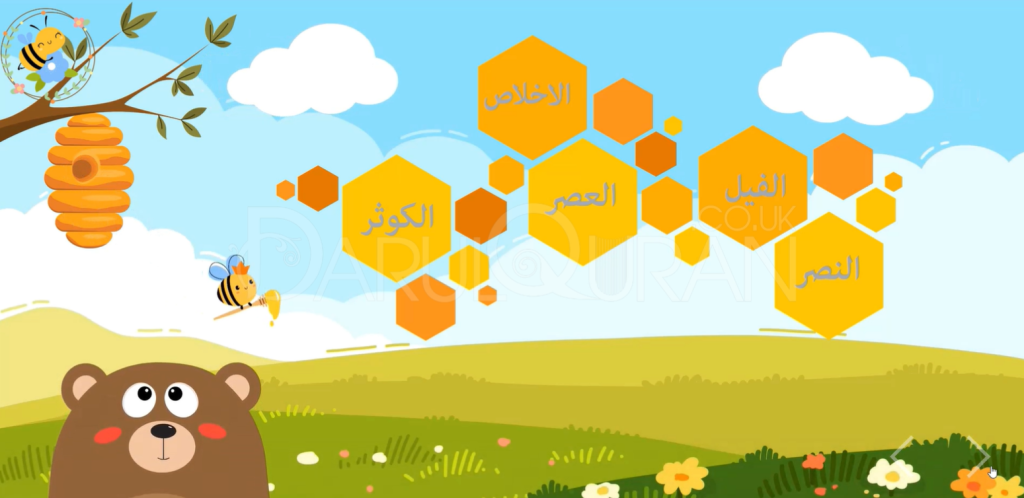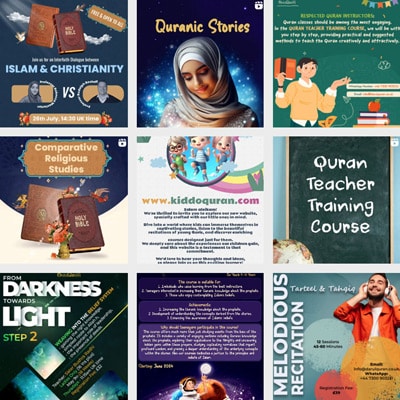Teaching Quranic words to children is a profound responsibility that helps instill a love for the Quran and a deep connection to its teachings from an early age. By engaging kids in meaningful and interactive learning experiences, we can help them build a strong foundation in understanding and appreciating the words of Allah. In this article, we will explore effective strategies and practical tips for teaching Quranic words to children, ensuring a transformative and joyful learning experience.

- Lay the Foundation
Begin by creating a positive and nurturing environment that fosters a love for the Quran. To create a positive and nurturing environment that fosters a love for the Quran, start by emphasizing the importance of Quranic words and the profound beauty they carry. Teach individuals that the words of Allah hold wisdom, guidance, and a deep love for His creation. Encourage them to approach the Quran with reverence and an open heart, recognizing it as a divine source of enlightenment and spiritual nourishment. By instilling this understanding and appreciation, individuals can develop a genuine connection with the Quran, fostering a lifelong love for its teachings and a desire to seek guidance from its profound words. - Start with Familiarization
Introduce children to the Arabic alphabet and the basic pronunciation of its letters. Focus on teaching them to recognize the shapes and sounds of each letter to develop familiarity and confidence. - Encourage Listening and Repetition
Engaging children in listening to Quranic recitations using age-appropriate audio resources helps familiarize them with the melodious nature of the Quran. It is important to choose recitations with clear pronunciation, rhythm, and melody. Encourage children to listen attentively and follow along with their fingers. After listening, engage them in imitating and repeating the recitations, focusing on pronunciation, intonation, and rhythm. Incorporate fun activities like echo reading or organize recitation competitions to make the learning experience enjoyable. This approach not only develops pronunciation skills but also deepens their connection and appreciation for the Quran. Provide positive reinforcement and praise to motivate children in their Quranic learning journey, building a strong foundation for further understanding. - Use Visual Aids
Enhance learning by incorporating appealing visuals and flashcards. Associate vivid images with Quranic words to help children grasp their meanings and create lasting connections in their minds.

- Teach Meaningful Vocabulary
Introduce a selection of commonly used Quranic words that hold significant concepts or values. Teach their meanings in simple and relatable language, emphasizing their relevance to everyday life. For example, Al-Hamdulillah means being thankful to Allah for blessings, InshaAllah signifies relying on Allah’s plans, SubhanAllah shows awe for Allah’s creation, bismillah means seeking Allah’s blessings before activities, and JazakAllah is used to express gratitude and wish for Allah’s reward. Highlight how these words can be incorporated into daily life, such as expressing gratitude, acknowledging Allah’s authority, appreciating nature, starting tasks in Allah’s name, and thanking others while asking for Allah’s reward. Encourage children to use these words consciously to strengthen their connection to the Quran and develop good character. - Contextualize with Stories
Incorporate storytelling to bring Quranic words to life. Narrate inspiring stories from the Quran, highlighting the words within their relevant contexts. Encourage discussion and reflection to deepen children’s understanding.

- Encourage Tafsir and Reflection
As children grow older and develop a deeper understanding, introduce them to age-appropriate Tafsir, which are explanations and interpretations of Quranic verses. Choose resources that are tailored to their age level, providing simplified explanations that they can comprehend and appreciate.
Tafsir books, online platforms, or interactive apps designed for children can help them gain insights into the meanings of Quranic words. Share stories and anecdotes from tafsir literature that highlight the contexts in which these words were used, the lessons they convey, and the significance they hold within the Quran.
Encourage children to reflect on the meanings and messages behind the Quranic words they are learning. Prompt them to ponder and engage in meaningful discussions about the deeper significance of these words in their lives and in the context of the Quranic verses they are encountering. - Memorisation through Repetition
Utilize repetition and memorisation techniques, such as reciting and revising Quranic words regularly. Break them down into smaller, manageable chunks to facilitate easier memorization and ensure retention. - Make it Joyful and Interactive
Create a joyful and interactive learning experience by incorporating games, quizzes, and competitions related to Quranic words. Utilize technology-based resources, interactive apps, or educational videos to make learning engaging and enjoyable for children. - Lead by Example
Serve as a role model by reciting and practicing Quranic words purposefully and regularly. Children learn best when they witness the importance that we place on the Quranic words ourselves.
Teaching Quranic words to children is a profound endeavor that fosters a lifelong connection with the Quran and its divine teachings. By creating a nurturing environment, utilizing interactive methods, and providing age-appropriate resources, we can guide children on an inspiring journey of Quranic word learning. May our efforts empower children to cherish the Quran, understand its message, and lead lives guided by its wisdom and compassion.
One of the schools that excels in this field is the DarulQuran academy.
In DarulQuran Academy there is a dedicated department for children. Parents who wish their children to learn the Quran effectively can confidently entrust their child’s education to this institution.
For more information, you can visit the DarulQuran Academy website:
https://lms.darulquran.co.uk/en/

















